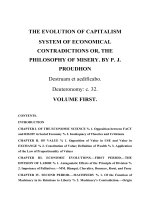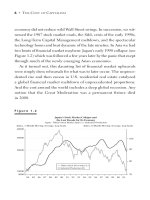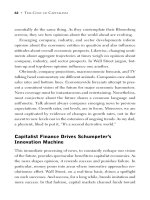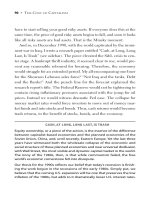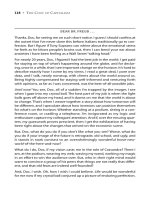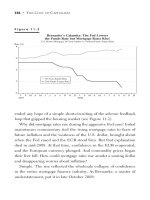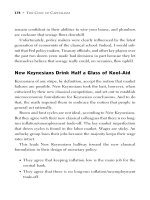The concept of capitalism
Bạn đang xem bản rút gọn của tài liệu. Xem và tải ngay bản đầy đủ của tài liệu tại đây (635.25 KB, 79 trang )
The Concept of Capitalism
Bruce R. Scott
The Concept of Capitalism
Professor Bruce R. Scott
Harvard Business School
Boston, MA 02163
USA
ISBN 978-3-642-03109-0
e-ISBN 978-3-642-03110-6
DOI 10.1007/978-3-642-03110-6
Springer Dordrecht Heidelberg London New York
Library of Congress Control Number: 2009931691
© Springer-Verlag Berlin Heidelberg 2009
This work is subject to copyright. All rights are reserved, whether the whole or part of the material is
concerned, specifically the rights of translation, reprinting, reuse of illustrations, recitation, broadcasting,
reproduction on microfilm or in any other way, and storage in data banks. Duplication of this publication
or parts thereof is permitted only under the provisions of the German Copyright Law of September 9,
1965, in its current version, and permission for use must always be obtained from Springer. Violations
are liable to prosecution under the German Copyright Law.
The use of general descriptive names, registered names, trademarks, etc. in this publication does not
imply, even in the absence of a specific statement, that such names are exempt from the relevant protective laws and regulations and therefore free for general use.
Cover design: WMXDesign GmbH, Heidelberg, Germany
Printed on acid-free paper
Springer is part of Springer Science+Business Media (www.springer.com)
Table of Contents
Preface – Page VII
Chapter 1 – Page 1
INTRODUCTION
Chapter 2 – Page 7
HISTORICAL CONCEPTIONS OF CAPITALISM
Chapter 3 – Page 11
SOME CURRENT CONCEPTIONS OF
CAPITALISM: DISCUSSION AND CRITIQUE
Chapter 4 – Page 21
MY CONCEPTION OF CAPITALISM
Chapter 5 – Page 39
POLITICAL AUTHORITY SHAPES CAPITALISM
WITH VISIBLE HUMAN AGENCY
Chapter 6 – Page 61
THE POLITICAL AND ECONOMIC
SYSTEMS ARE INTERDEPENDENT
Chapter 7 – Page 67
CONCLUSIONS
Epilogue – Page 73
WHY THIS SHORT BOOK AND WHY NOW?
Preface
T
his monograph on the concept of capitalism is the intellectual core
of a larger work, entitled Capitalism, Its Origins and Evolution as
a System of Governance, due for publication November 2009.
The purpose of this monograph is to put forth an original concept of capitalism as a system of governance, including a theory of how it functions at
any point in time and how it evolves through time. In the larger book, I
present a theory of its origins and evolution and support this theory with a
set of country case studies that span both time and geography. It was, in
fact, my experience in studying these case studies that led me to the concept presented here as well as to the theory of capitalism’s origins and evolution.
In the larger book, I build on the present work, identifying and explaining capitalism as a system of governance for political entities such as nation states. I then supplement these ideas with a description and explanation of three generic economic strategies. Taken together, my studies of
economic strategies and specific capitalist systems of governance are intended to enhance and enrich existing literature on “varieties of capitalism”. The larger book also includes two appendices; the first explains
each of the three levels of capitalism as a system of governance in some
detail, while the second focuses on the role of firms as key actors in a
modern capitalist system, as illustrated with a US example. Together, the
case studies and supplementary appendices will provide readers with a
deeper understanding of capitalism as a system of governance, grounded in
events both historical and contemporary, albeit with a distinctive emphasis
on the experiences of the US from 1630 to 2008.
THE CONCEPT OF CAPITALISM
In publishing this very condensed version of the core theory of the longer
book, I would like to acknowledge the support of a few individuals who
played unusually direct roles in my work on these two texts. First, I would
like to acknowledge the special role of Niels Peter Thomas, my editor at
Springer Verlag, in shaping the entire text, including suggestions for the
addition of two chapters on the most recent transformations of US capitalism. I would also like to acknowledge the role of Sarah Potvin, my Research Associate from June 2005 to June 2007, for encouraging me to read
the writings of Robert Dahl and others on democracy as well as for writing
a draft of a chapter on US capitalism in the period 1630-1830. In addition,
I would like to acknowledge the role of Linnea N. Meyer, my Research
Associate from June 2007 to the present, for writing a draft of a chapter on
US capitalism in the period 1830-1937 and for playing a very important
role in editing much of the larger book as well as this monograph. I have
been very fortunate to have these colleagues and many others as sources of
encouragement over these last four years on a project that was initiated in
the early 1990s. I have also been fortunate to have had the financial support of the Division of Research at Harvard Business School for both my
time and that of a Research Associate over the past 15 years as I composed
both this work and the longer book. Finally, I would like to acknowledge
the role of Grenelle, my wife, who has been a sounding board, editor,
proof reader and source of encouragement on this project for almost twenty adventurous years.
Bruce R. Scott
May 2009
VIII
Chapter 1
–
Introduction
T
wo systems of governance – capitalism and democracy – prevail
in the world today. Both systems are built upon the notion of indirect governance through regulated competition as the key coor-
dinating mechanism among various actors. They can operate simultaneously within the same society because they operate in partially distinct domains; at the same time they can and do influence each other. Indeed, participants in one system can use their positions in that system as a base from
which to compete for power in the other.
Competition among economic and political actors is not unique to capitalism and democracy; indeed, the actors of most if not all pairings of economic and political systems of governance are likely to compete for power, as economic resources can be used to purchase political resources, and
political resources can be used to generate or distribute economic resources. What makes the power struggle between capitalism and democracy distinct and, I believe, to warrant further examination, is that such use
of one system’s resources to influence those of the other becomes misuse
when held up against the systems’ respective principles of free markets
and universal political liberties or, more generally, equal opportunity to
participate in either system. The goal of leaders in any society characterized by both capitalism and democracy should therefore be to mitigate
such misuse of economic or political power, establishing institutions and
rules that condition the behavior of actors in each system, economic and
political.
THE CONCEPT OF CAPITALISM
However, such a goal cannot be achieved if these leaders and, as it were,
society at large, do not understand how these systems function, how they
influence each other, or even that they are systems at all. Neither capitalism nor democracy is easily understood and, indeed, there is no standard
definition of either. My primary purpose in this work is to provide an original definition and thus a better understanding of capitalism alone, namely:
Capitalism is an indirect, three level system of governance for economic
relationships, as I will explain shortly. I make no claim to provide an original definition of democracy; throughout this work, I assume democracy
implies that power in the political system rests with political leaders who
are held accountable to a free society by appropriate institutions through
periodic elections. I contrast democracy with oligarchy, a condition where
significant political power is vested in the economic system and is not necessarily held accountable to anyone.
To understand capitalism as a system of governance is to transcend the
boundaries of standard neo-classical economic analysis, moving beyond
merely the markets of pure economics to include the institutions and authorities of political economy. Such an understanding requires a more holistic analytic approach, one including insights from political science, sociology and the law. While there could be a number of causes for the
apparent difficulties in arriving at a consensus definition of capitalism, it is
at least partly due to the question of other attempts being limited by the
bounds of a single academic discipline, typically economics.
There is little reason to suppose that defining how a system of governance works should be easy, and a number of distinguished scholars have
made important contributions toward such a definition. Adam Smith provided a remarkable insight into how the markets of capitalism can coordinate the actions of literally thousands or millions of people, without any
conscious guidance on the part of the quasi-independent economic actors,
as they equilibrate supply and demand through the price mechanism. And
about a century later, neo-classical economics emerged, with a small group
2
THE CONCEPT OF CAPITALISM
of British economists recognizing that it was the markets that established
the values of various good and services, rather than the intrinsic properties
of these items.
These discoveries, path-breaking as they were, remain insufficient as a
working definition or understanding of capitalism, since they tend to focus
on the achievement of market-based equilibrium as though equilibrium, by
itself, stands for economic governance. However, the realities of market
economies have shown time and again that equilibrium can be achieved in
distorted markets where supplies include goods produced by slaves or other forms of forced labor, in speculative bubbles where excessive leverage
permits buyers to generate unsustainable levels of demand or supply or, on
the contrary, in depressed markets where effective demand is far below a
nation’s capacity to produce. For equilibrium to be a true reflection of effective societal governance, market prices must reflect true social costs
(i.e., factor in the value of the goods and services to society as a whole)
and demand must reflect sustainable demand without the use of undue financial leverage by the borrower or the lender (i.e., factor in the long-term
as well as the short-term demands).
However, it is not the role of the market actors to decide what costs and
benefits are to be included in a market price; instead, those cost-benefit decisions are shaped by government and typically by legislatures. Imperfections, such as externalities, are the rule and not the exception; indeed they
are to be expected of a system where imperfect political markets inevitably
lead to imperfect legislative solutions that then impose imperfect institutional frameworks to underpin the economic markets. Only a political authority can correct these market frameworks, and this in itself should warn
us that externalities will never be eliminated. Thus a market economy
should be presumed to contain distortions that range from small to large,
and even “extra-large.”
Furthermore these distortions can range far
beyond asymmetries of information to include asymmetries of power and
their routine abuse.
3
THE CONCEPT OF CAPITALISM
Thus, it really matters to think of the economic markets of capitalism as
part of a system of political economy and not just one of economics. My
conception of capitalism broadens the focus from market operations to include both the institutions that shape the market frameworks and the political authority that designs as well as governs the institutions in which markets are embedded, and thus encompasses political economy rather than
the narrower notion of pure economics. In proposing this conception, I
aim to suggest that the evolution of a capitalist system is as much a political phenomenon as an economic one, and specifically that it requires the
visible hands of political actors exercising power through political institutions, such as elections and legislatures, in activities that are remarkably
different from the unguided or invisible hand that Smith so astutely recognized.
The following monograph will proceed as follows: After a brief overview and critique of current conceptions of capitalism, I delve into the details of my own. I organize this discussion around the major characteristics of capitalism: (1) Capitalism is an indirect system of governance; (2)
capitalism is analogous to organized sports; (3) capitalism is comprised of
three levels—markets, institutions, and political authority; (4) the third
level of political authority underscores the role of visible human agency,
not just that of invisible market forces, in capitalism; (5) the political authority has the administrative opportunity and arguably the responsibility
to shape the capitalist system to favor certain interest groups over others,
as well as the entrepreneurial responsibility to modernize the capitalist system over time; (6) capitalism is a system of governance not only for private goods but also for public or “common” goods, where some of the
most important of those common goods are the market frameworks themselves and where political authority, not market forces, is essential for governing the latter; (7) political authority inevitably shapes capitalism according to a strategy, no matter how implicit or imperfect that strategy
might be; and (8) political and economic markets determine the nature of
4
THE CONCEPT OF CAPITALISM
political authority, such that the political system of governance and the
economic system (i.e., capitalism itself) are not only interdependent but also a theater of competition in which economic and political actors compete
with each other for power.
I conclude with a summary of the work, restating my definition of capitalism in more simple terms and suggesting directions for the future study
of capitalism as well as implications for contemporary society.
5
Chapter 2
–
Historical Conceptions of Capitalism
H
istorians, most notably Fernand Braudel with his three-volume
Civilization and Capitalism1, have traced the origins of the term
capitalism to the mid-1800s. However, its notoriety came a few
decades later, from socialists who used it as a term to describe what they
disliked about the workings of liberal markets. Karl Marx, arguably one of
the most prominent socialists of the time, used it as a way to refer to a system of markets that in his view favored capitalists at the expense of society.2 His notion was, of course, conditioned by historical experience up to
his own time as well as his own perspective on that history; when he was
writing, markets appeared to inevitably pit capitalists versus the proletariat,
without much regard for the fact that a democratically elected government,
or even a limited monarchy, might intervene to protect the interests of the
middle classes let alone the poor. In his era in both the United States and
Europe, capital was achieving extraordinary power for newly emergent industrialists. For example, the largest firms in the US grew from perhaps
100 employees in 1800 to more than 100,000 a century later, and they
grew still more in terms of the financial and physical resources at their
1 Fernand Braudel, Civilization and Capitalism, 15th-18th Century, Vol.
II (Berkeley: University of California Press, 1992), 237.
2 Michael Merrill, “Putting ‘Capitalism’ in its Place: A Review of Re-
cent Literature.” The William and Mary Quarterly, 3rd Ser., Vol. 52, No.
2. (April, 1995), 315-326: 322. Footnote 21 gives a very lucid description
of some of the history, though mostly in a US context.
THE CONCEPT OF CAPITALISM
command.3 This extraordinary accumulation of private power called for a
new conception of capitalism; Adam Smith’s conception of atomistic capitalism, where firms had little or no economic power, was hardly an adequate framework for such analyses. At the same time, there were virtually
no large-scale democratic states until almost the end of the 19th century;
Britain enlarged its electorate from about 1.5% of its population to 2.5% in
1832, and then only by the late 19th century began to add wealthy merchants and manufacturers to its class of wealthy aristocrats. The US was
the outstanding exception, as Alexis de Tocqueville recognized during his
first hand study of the US in 1830.4 But the fact that governments had not
mounted much by way of any of successful attempts to embed markets in
regulatory frameworks to protect labor, a critique brought up by Karl Polanyi, did not mean that they could not do so, as Marx implied, but only
that it had not yet done so.
Despite its grounding in a particular historical context, Marx’s critique
became an influential understanding of capitalism during the mid- 19th
century, and his ideas served as a sort of handbook for revolutionary activities. Notably, they provided a covering ideology for those who wanted
to establish totalitarian regimes to suppress the power of the capitalists in a
perverted recipe that allowed a few to govern in the name of the proletariat, while in reality they were not held accountable to anyone. In such a
context, capitalism was hardly a term of approbation. Indeed this competition for ideas and for power was clouded by the fact that capitalism had
been defined by its adversaries more than by its proponents; proponents
3 Alfred Chandler, The Visible Hand (Cambridge: Belknap Press of
Harvard University Press, 1977), 50-65, 204. Alfred Chandler reports that
prior to 1840, few firms employed over 50 workers, but that by 1891, the
Pennsylvania Railroad Company alone employed over 110,000 and, indeed, it was not even the largest US railroad in terms of mileage at the
time.
4 Alexis de Tocqueville, Democracy in America (New York: Alfred A.
Knopf, Inc., 1945).
8
THE CONCEPT OF CAPITALISM
were preoccupied with resolving differences between utopian views, such
as those of Robert Owen, with the near opposite view of laissez faire capitalism, a view that assumed market outcomes were based upon a system
that predated government and were therefore not to be disturbed by government, with rare exceptions. The democratic alternative to both sets of
views had yet to show much either in theory or practice that it could form
market frameworks meeting Polanyi’s challenge.
This very brief introduction to the history of capitalism in the 19th century is only intended to suggest that, by the late 19th century, it was a rather
imperfect alternative to feudalism, in fact creating a new order that was
open to huge concentrations of power that simply replaced those of the
earlier order. Thus, ironically, capitalism came to be defined by some of
its critics as the rationale for creating a centrally planned, coercive state
that would monopolize power even more than its feudal predecessor. Although the democratic capitalism that we tend to take for granted today already existed in a few places, such as the United States, its existence was
pushed into the shadows by the obvious presence of the new industrial
giants, even in the United States, in the mid 19th century. Democratic capitalism has been challenged almost since its inception by oligarchic capitalism, though in the US case this challenge was delayed for some 200 years
or more.
Over the last century and a half, the prevailing conception of capitalism
has undergone a rather remarkable evolution, in terms of both its inherent
structure and its impact on societal outcomes, both of which are of very direct import for this discussion. A century or more ago, the notion that markets were political as well as economic constructs was obvious; indeed,
economics was then called political economy. At the same time, capitalism
was a little used term, except as an epithet by its critics. Since then, economics has gradually narrowed its focus from political economy to economic relationships. From there, the focus has narrowed further to economic relationships that can be mathematically modeled, as though
9
THE CONCEPT OF CAPITALISM
economics were a science devoted to the discovery and exposition of a
system of natural laws. From this narrowed perspective, microeconomics
has become the study of how markets – traditionally, the essential institution of capitalism – coordinate decentralized decision-making through a
price mechanism to bring supply and demand into equilibrium without any
explicit human agency or planning. Economic actors are presumed to interact on the basis of rational self-interest in a largely self-regulating economic system controlled by the laws of supply and demand. Rational selfinterest is presumed to be universal and context-free (not to mention bubble-free), as are the laws of supply and demand. And capitalism, though
based upon property rights created by human agency, is presumed to be
able to achieve optimal outcomes for society without the benefit of explicit
human agency, as though markets were controlled by natural forces akin to
those of a gravitational field, a claim that might have been plausible in
Smith’s era, but surely is not in our own. In the terms to be used in this
monograph, microeconomics and the prevailing conception of capitalism
are now largely focused on markets alone. As this market-based conception of capitalism is one with which my definition most strongly contrasts,
I find it appropriate to describe and then critique it here, before introducing
my own view.
10
Chapter 3
–
Some Current Conceptions of
Capitalism: Discussion and Critique
A
s I suggest above, many economists and even many historians
today tend to equate capitalism with markets, and the activities
of market actors alone. Capitalism, for them, is a system of nat-
ural forces, i.e., supply and demand, that naturally tend toward equilibrium. Notions of governance, let alone government, have little if any
place within this impersonal, “scientific” system and are, in fact, often accused of corrupting or distorting capitalism. The strength of this marketbased conception of capitalism has been apparent for many years, as highlighted by social historian Michael Merrill over a decade ago. In a 1995
review of contemporary conceptions of capitalism, Merrill pointed out the
prevalence of the market-based conception and the challenges inherent in
overcoming it: “If capitalism is little more than a synonym for a market
economy, then any opposition to capitalism necessarily becomes an opposition to markets – in other words, an opposition so rarified and unreasonable to most people as scarcely to matter historically…”5 But such opposi-
tion is crucial, he asserts, because capitalism is not simply a product of
economics but of political economics.6
Thus far, I agree with Merrill. However, I feel that his argument ultimately disappoints in that he does not propose a sufficient alternative con5 Merrill, op. cit., page 317.
6 Merrill, op. cit., page 317.
THE CONCEPT OF CAPITALISM
ception. For him, “Capitalism, properly speaking, is not just an economic
system based on market exchange, private property, wage labor, and sophisticated financial instruments…Capitalism, more precisely, is a market
economy ruled by, or in the interests of, capitalists.”7 This second conception, while somewhat of an improvement on the first, fails to capture the
actuality of capitalism in two key ways. First, it assumes that the interests
of capitalists not only do prevail but should prevail in any capitalist system; it overlooks the possibility and even the desirability of governing
markets in the interest of society as a whole. Second, it presupposes a notion of governance without explicitly recognizing the actual roles that human agents from the political sphere must play in a capitalist system if the
market frameworks are to reflect the public interest through proper recognition of true social costs and benefits. Thus, Merrill leaves us with a critique of the market-based conception of capitalism without effectively
moving beyond it. By tagging on the notion of the power of so-called capitalists, Merrill seems to be placing the theory of market-based capitalism
in the context of what he sees in his own contemporary society; he does
not ask if the contemporary context may be aberrant. But Merrill is certainly not alone in providing a clear and pointed critique, yet a less-thanrobust alternative. Others have been equally unsuccessful in challenging
the prevailing conception of capitalism, and, I believe, it is not least because this conception has been so effectively put forth by economists over
the past half-century, and notably by Milton Friedman, whose work I review below.
The work of Milton Friedman, a Nobel Prize winning economist who
became famous as a leader of the so-called Chicago School, is perhaps one
of the most important representatives of today’s market-based theories of
capitalism. In his much-cited book Capitalism and Freedom, Friedman
takes a more focused and less historical perspective of capitalism than I
7 Merrill, op. cit., page 317.
12
THE CONCEPT OF CAPITALISM
do; he emphasizes the coordination of economic actors through voluntary
bilateral transactions in a marketplace. Friedman states that the main
theme of his book is to elaborate on “the role of competitive capitalism –
the organization of the bulk of economic activity through private enterprise
operating in a free market – as a system of economic freedom and a necessary condition for political freedom.”8
In his conception of capitalism, i.e., competitive capitalism, Friedman
is primarily focused on trade, and he is much concerned about political
freedom. He points to the economic freedom of markets as essential to its
political equivalent, a proposition that finds strong support in the political
science literature. However, for Friedman, political freedom seems to
mean the absence of coercion of one individual by others:
“The fundamental threat to freedom is power to coerce, be it in the
hands of a monarch, a dictator, an oligarchy, or a momentary majority. The preservation of freedom requires the elimination of such
concentration of power to the fullest possible extent and the dispersal and distribution of whatever power cannot be eliminated – a system of checks and balances. By removing the organization of economic activity from the control of political authority, the market
eliminates this source of coercive power. It enables economic
strength to be a check to political power rather than a reenforcement.”9
Essentially Friedman defines freedom as freedom from coercion by others,
and implicitly assumes that those “others” are political actors and not economic actors. In other words, Friedman assumes that only government can
concentrate enough power to threaten the freedom of individuals; the concentration of power in the economic realm, such as by giant firms, and its
threat to the freedom of individuals, such as that of smaller firms or the
8 Milton Friedman, Capitalism and Freedom, 40th Anniversary Edition
(Chicago: University of Chicago Press, 1962), 4.
9 Friedman, op. cit., page 15.
13
THE CONCEPT OF CAPITALISM
employees of firms of any size, are omitted from his analysis, except for
monopolies. Friedman overlooks the power of one firm to coerce another;
when he assumes that competition eliminates economic power, he seems to
overlook the fact that firms with thousands of employees compete with
others that may have only one hundred employees or perhaps only ten. To
speak of the transactions between giant firms and small ones as voluntary
and without coercion seems quaint, almost as though it could be used to
describe bilateral encounters between a whale and a school of minnows,
from the whale’s point of view. Relative size does not necessarily equate
with relative power, but to ignore the potential for unequal power relationships in the private sector, and to focus only on its exercise by political authorities, seems a considerable oversimplification.
Overall, Friedman simplifies the reality of economic “freedom” by
omitting consideration of the meaning of freedom to those members of society with relatively less economic power than others, in terms of meager
resources, little education or human capital, and/or no financial capital
with which to take advantage of market opportunities. Friedman seems to
assume that inequalities in economic power are adequately controlled
through competition, so long as most of the firms are privately owned, and
that it is therefore only explicit inequalities of political power that must be
avoided at all costs.
In point of fact, power relationships among individuals are rarely equal
and, among various firms or teams of economic actors, even less so.
Those with greater economic power can employ it as they bargain in markets or lobby political actors, while using even more overt coercion in less
organized settings. In this more realistic perspective, economic power can
be a force for the subversion of equality among persons, and thus a force
for the subversion of freedom and democracy. To be compatible with democracy, and thus with the freedom of which Friedman conceives, capital-
14
THE CONCEPT OF CAPITALISM
ism needs to be modified or transformed in some way, as Robert Dahl has
written.10
Modern economics has begun to recognize the narrowness of Friedman’s vision, incorporating a notion of transformation into the study of
capitalism. Specifically, in recent decades, formal economics has extended
its field of study beyond markets to include the identification and examination of the institutional foundations of capitalism. Douglass North, a professor of economic history and recipient of the 1993 Nobel Prize in Economics, has been a pioneer in pointing out the need for such a change. As
he implied in his acceptance speech: “There is no mystery why the field of
development has failed to develop during the five decades since the end of
the Second World War. Neo-classical theory is simply an inappropriate
tool to analyze and prescribe policies that will induce development. It is
concerned with the operation of markets, not with how markets develop.”11
North proposes a broader perspective, one that includes the forces framing
those markets, i.e., institutions. He explains in his work that “Institutions
provide the incentive structure; as that structure evolves it shapes the direction of economic change toward growth, stagnation or decline.”12 In recognizing that institutions shape the direction of economic change, Professor North implicitly recognizes that institutions shape markets in ways that
can shape the behavior of market actors and eventually the path of economic growth as well. However, when he posits that institutions evolve,
he does not take the next step to tell us how they evolve and whether their
10 Robert Dahl, Democracy and Its Critics, (New Haven: Yale Univer-
sity Press, 1990). Dahl’s writing here is further cited in Gabriel Almond,
“Capitalism and Democracy,” PS: Political Science and Politics, Vol. 24,
No. 3, (Sep., 1991), 467-474: 470.
11 Douglass North, Nobel Prize Speech. December 9, 1993. Published
in Nobel Lectures, Economics 1991-1995, ed. Torsten Persson (Singapore:
World Scientific Publishing Co. , 1997)
12 Douglass North, “Institutions,” The Journal of Economic Perspec-
tives, Vol.5, No 1, (1991): 97.
15
THE CONCEPT OF CAPITALISM
evolution is a spontaneous process, like biological evolution, or one that is
guided by human agency, like the construction of a road or a constitution.
What theories based on the work of Friedman and North miss is the
idea of human agency in capitalism. True, the evolution of the institutions
of capitalism is partially a spontaneous process that can spread gradually
on its own, like increased sales and geographic distribution for a product or
increased diversification in the output of a firm. But it is also partially an
intentional process; unlike changes to sales that happen gradually and
largely at the initiative of the firm, changes to the institutions that shape
markets depend in large measure on political as opposed to economic
choices, as when a state promulgates a new set of regulations that require
changes in behavior from the economic actors. Friedman, North, and many
others miss this notion of agency because they focus more on the trading
paradigm of capitalism (i.e., private parties transacting business in markets) than on its production paradigm (i.e., private parties mobilizing resources to develop technologies in search of profits and thereby potentially
exercising great influence over the direction of the markets).13
A brief elaboration of these two paradigms is in order here, such that
the oversight of these economists is well understood. The trading paradigm can be broken down by the actors and forces involved, as follows:
Private parties are allowed to transact business in markets, including entry
into and exit from specific activities, while the price mechanism balances
supply and demand, a framework of laws and regulations governs the
competition, and an accountable government provides security, administers laws, and modernizes laws as appropriate. The production paradigm
can be similarly characterized in terms of its primary actors and forces:
Private parties are allowed to mobilize resources through various legal vehicles such as corporations to develop and exploit new technologies in
13 For a similar perspective, arrived at independently, see Erik S. Rei-
nert, How Rich Countries Got Rich and Why Poor Countries Stay Poor
(London: Constable, 2007).
16
THE CONCEPT OF CAPITALISM
search of profits, while corporations are permitted to lock in shareholder
capital indefinitely at the discretion of the board of directors,14 and they are
permitted the rights of self-governance through hierarchies; shareholders
are shielded from losses through legislative grants of limited liability;
managers are permitted to coordinate activities across functions and sectors through hierarchical organizations; employers are permitted to use implicit coercion, such as the loss of a job for employees who fail to carry out
assigned roles; and competition for profits governs the allocation of resources and of internal rewards.
To ignore this second paradigm and see capitalism as nothing more
than a system for trading, is to see it only with one eye, effectively overlooking what is arguably the greater source of the gains in technology and
growth for which capitalism is known and, at the same time, the arena that
is most susceptible to gross abuses of power.15 Moreover, to overlook the
production paradigm is to overlook the primary opportunities for human
agency within capitalism. To explain: The trading paradigm requires institutions to play a supporting role in governing the markets in which trade
occurs; the production paradigm, in contrast, requires them to play a much
more active role in establishing and monitoring a decentralized system of
private power and thus, in turn, further requires human agents to play a decision-making role with respect to the legal rights and responsibilities attached to such power. Put more simply, the former focuses on the product
markets (i.e., for tradable commodities) by providing a framework in
which to trade, while the latter focuses on the factor markets (i.e., for land,
labor, and capital) by determining the relative mobility of resources and
therefore the resulting distribution of power within the markets. To overlook the latter is to overlook the crucial processes through which capital14 Margaret Blair, “Locking in Capital: What Corporate law Achieved
for Business Organizers in the 19th Century,” UCLA Law Review, Vol. 51,
No. 2 (2003): 387-455.
15 For a good discussion of this, see Reinert, op. cit.
17
THE CONCEPT OF CAPITALISM
ism actively evolves over time. For instance, absent the historical decision
to reallocate the legal right to land ownership from established parties
(e.g., the lords and the clergy) to a wider range of individuals, political, social and economic power would remain in the hands of a few, feudalism
would persist indefinitely, and modern capitalism might never have
emerged. Focusing on trade misses the importance of the production paradigm in developing the factor markets and thus in developing capitalism itself. Moreover, it misses the role of human agents, specifically political actors, in the emergence and ongoing evolution of capitalism.
As advanced as North’s work is, relative to neoclassical economics, he
joins Friedman in focusing more on trade than on production, more on the
product markets than on the factor markets, and more on markets and their
supporting institutions than on politics – and thus the human agency –
shaping them. According to North, “The central issue of economic history
and of economic development is to account for the evolution of political
and economic institutions that create an economic environment that induces increasing productivity.”16 While true, accounting for the evolution of
the institutions that enhance productivity takes one further into the realm
of political science than North goes, examining how the capacities of governments are in turn influenced by political institutions that are quite simply outside of the purview of organized economics.
In a later work North does express greater awareness of the agency of
the political realm in shaping the economic realm, specifically in terms of
shaping property rights: “The efficiency of the political market is the key
to this issue. If political transaction costs are low and the political actors
have accurate models to guide them, then efficient property rights will result. But the high transaction costs of political markets and subjective perceptions of the actors more often have resulted in property rights that do
not induce economic growth, and the consequent organizations may have
16 North, op. cit., page 98.
18
THE CONCEPT OF CAPITALISM
no incentive to create more productive economic rules.”17 Yet this analysis
still reveals a narrow view of capitalism. North identifies a role for political agency, but circumscribes this agency as one driven by cost-benefit
analysis; in other words, political markets exist, but they function as simplistically as Friedman’s economic markets and lead to similarly simplistic
outcomes of economic growth or decline. Inequalities in economic and
political power, as well as their tendency to shape institutions and their
outcomes, are completely missing from the picture.
North’s work thus not only oversimplifies the evolution of institutions
that enhance productivity, but also underemphasizes the idea that institutions can induce or reduce inequalities within society. The latter certainly
merits attention, if only because excessive inequalities open the way for
the empowerment of elites who can use their economic power to subvert
legitimate government, especially if it is a nominally democratic government. As Tocqueville observed more than 150 years ago, most revolutions
have been started either by people who wanted to reduce existing inequalities or, at the other extreme, to avoid their reduction, a pattern that further
illustrates how a society’s political and economic systems are inevitably
intertwined.18 Economic governance thus inevitably involves political institutions as well as political objectives, and capitalism cannot be reduced
to the impersonal science of market forces alone.
To view capitalism as a system of governance, we must follow North’s
progress beyond Friedman to recognize the decisive role of institutions in
shaping the markets, equilibrium or no. But we must then go further to
recognize that the evolution of these institutions is in turn built upon human agency, as the political system determines the rights, responsibilities,
and resulting powers of individuals and institutions within the economic
17 Douglass C. North, Asbjorn Sonne Norgaard, and Richard Swed-
berg, Institutions, Institutional Change and Economic Performance,
(Cambridge: Cambridge University Press, 1990), 52.
18 Tocqueville, op.cit., page 611.
19

